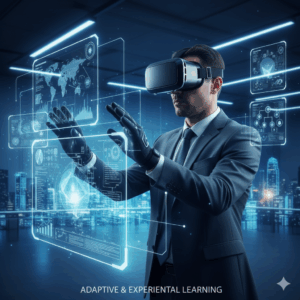Introduction
Leadership has always been a vital cornerstone of organizational success. Yet in today’s fast-changing business environment, traditional leadership training methods are losing relevance. Organizations face new realities—technology disruption, hybrid workplaces, cultural diversity, and constant global change—that require leaders to be flexible visionaries rather than conventional managers.
In this evolving landscape, disruptive frameworks in leadership development have emerged. These strategies move far beyond classroom lectures or standardized training modules. Instead, they focus on experiential learning, adaptive programs, emotional intelligence, and cross-functional collaboration. The goal is to cultivate leaders who can inspire innovation, guide diverse teams, and drive sustainable growth under conditions of stress and uncertainty.
Disruptive Frameworks in Leadership Development
The rise of disruptive frameworks in leadership development highlights a shift from rigid, one-size-fits-all programs to more human-centered, flexible models. Organizations now recognize that leadership is not only about technical proficiency or strategy execution—it is about resilience, empathy, and the ability to manage complexity. These frameworks prepare leaders to handle both immediate challenges and the unexpected disruptions of tomorrow.
The Shift Toward Adaptive and Experiential Learning
One of the most significant innovations in leadership training is the move away from traditional classroom-based instruction. Leaders today need real-time problem-solving abilities, not just theoretical knowledge.
Experiential learning allows leaders to immerse themselves in simulated environments that mirror real-world complexities. Through leadership simulations, cross-department projects, and rotational assignments, leaders gain exposure to diverse situations that test their decision-making and people management skills. These opportunities help future leaders become more agile, learn from failure, and adapt quickly to ambiguity.
Building on this, adaptive learning tailors leadership development to each individual. Using AI and digital platforms, adaptive programs track performance, identify strengths and weaknesses, and provide personalized feedback. Unlike traditional one-size-fits-all training, adaptive methods ensure leaders get customized support aligned with their unique growth paths. This approach makes development continuous, practical, and results-oriented.
By embracing adaptive and experiential learning, organizations prepare leaders not only for today’s demands but also for tomorrow’s unpredictable shifts.
Building Emotional Intelligence in Leadership
Another major disruptor in leadership frameworks is the emphasis on emotional intelligence (EI). Strategic vision and technical skills are still necessary, but leaders who lack empathy, communication skills, and emotional awareness often struggle to achieve long-term success.
Emotional intelligence equips leaders with self-awareness, self-management, social awareness, and relationship management skills. These attributes foster trust, strengthen cooperation, and enhance communication within teams. Leadership development programs now regularly include training in active listening, empathy building, conflict resolution, and diversity management.
As workplaces evolve into more people-centered ecosystems, EI ensures leaders can inspire motivation, encourage employee happiness, and cultivate resilience. Leaders with strong emotional intelligence not only drive performance but also build cultures of loyalty, creativity, and innovation—qualities critical for long-term organizational competitiveness.
Encouraging Cross-Functional Collaboration
Modern organizations no longer operate in silos. Today’s leaders must manage interdependencies across finance, technology, operations, marketing, and human resources. Cross-functional collaboration is therefore a game-changer in leadership development.
Cross-disciplinary initiatives train leaders to integrate diverse perspectives into end-to-end solutions. Team-based problem-solving and collaborative leadership projects encourage adaptability and stronger networks across organizational levels. This enables leaders to break down barriers, foster innovation, and create holistic strategies.
Equally important is developing a global mindset. In a globalized economy, leaders must be sensitive to cultural differences, understand international markets, and adapt to diverse workforce dynamics. Programs such as overseas assignments, virtual global teams, and partnerships with global institutions equip leaders with the ability to make both locally effective and globally relevant decisions.
Through cross-functional and global training, organizations develop leaders capable of steering growth in multicultural and interconnected environments.
Conclusion
The world of leadership development is being redefined. Gone are the days when a series of classroom lectures and technical skills training were enough to prepare executives for success. Today’s organizations need leaders who are adaptive, emotionally intelligent, and globally minded.
By embracing disruptive frameworks in leadership development, companies are investing in future leaders who can thrive under pressure, inspire their teams, and build sustainable growth strategies in uncertain times. Adaptive and experiential learning, emotional intelligence, and cross-functional collaboration are not just tools—they are survival strategies for the 21st-century organization.
Businesses that invest in these innovative approaches can be confident that their leaders will not only handle today’s challenges but also shape tomorrow’s opportunities.
For deeper insights into leadership and business trends, explore IMPAAKT, the top business magazine trusted by global leaders.















